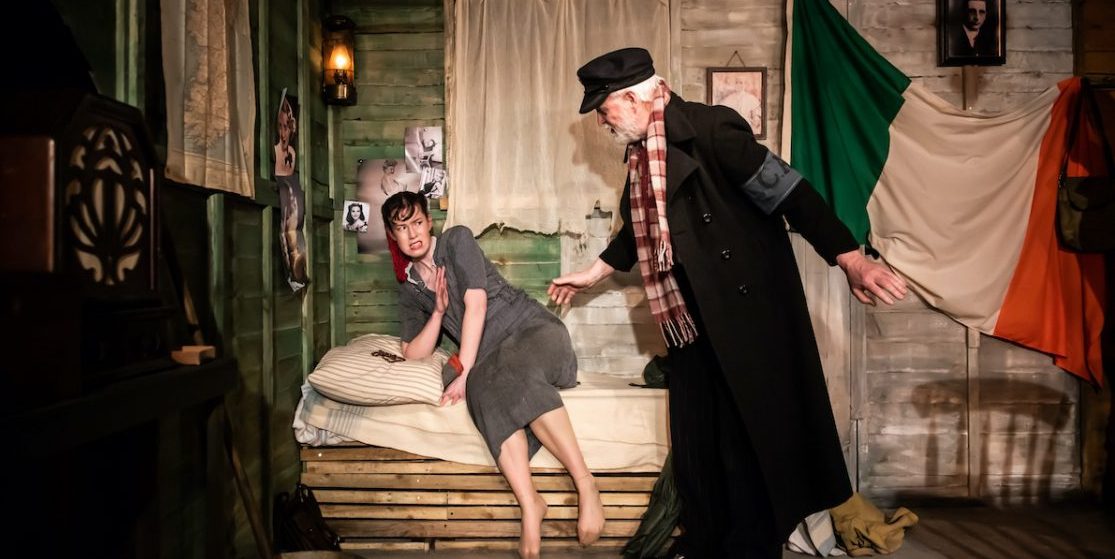‘Strange Fish Theatre’ perform a very valuable role in bringing to the UK the best of Irish playwrighting, whether classic or more recent. Their last production, also in Clapham, was a notable version of Frank McGuinness’ ‘The Match Box.’ ‘Dev’s Army’, a tragi-comedy on very different themes, attains a similar standard and deserves to be seen.
On one level this is a play about the Irish Home Guard in World War Two, and much of the humour comes out of the pratfalls and amateurism associated with the ‘Dad’s Army’ genre. Three men are based in a lookout hut on the coast near Dublin on a raw stormy November night in 1940. Stuart D Lee sets up their personalities well and the clashes of views between them. He also introduces significant props as well so that on the principle of ‘Chekhov’s Gun’ we know will have to be used in the later course of the action.
Paul Murphy dominates the opening sections as Paddy Devlin, a source of elderly and mostly unreliable volubility, but with great charm and fine jokes attached. As his foils we have Nick Danan as Dermot Ryan, a tougher customer altogether, and a real war veteran; and alongside him Eoin McAndrew as Michael O’Connolly, a much younger man, and a little too dim to be true. But overarching this humour triangle is a very serious and still controversial debate about Ireland’s neutrality in World War, a policy insisted on by Eamonn De Valera, whose austere portrait dominates the middle of the set alongside an Irish tricolour. A short review is not the place to expand on this but suffice to say that Lee expertly weaves the contending views into the arguments so that their moral worth can be weighed. He also provides an admirably succinct summary of the issues and events in the programme.
Up to this point I thought we were headed in a Bernard Shaw direction – a comedy of ideas, played with fizz and vigour. But then the tone changes to film noir, as a huge explosion is heard. They find an unconscious woman on the beach who turns out to be very different from first pitiable appearances. Niamh Finlay’s Betty Pope (clearly not her real name!) leads us into a thrilling final half-hour in which she cunningly uses the very arguments and divisions so carefully assembled earlier on to launch a violent sequence of events. There is truly visceral tension here, especially in the verbal duel with Nick Danan, who has seen through her sob story. The final ten minutes contain multiple actions and revelations that would count as spoilers to disclose.
This is a tiny stage in an upstairs room, but all involved deserve great credit for the feeling of earned authenticity everyone achieves. Phil Newman has assembled a beautifully detailed and furnished set with every object justifying its place. The actors, director and fight director construct a natural fluency in rapid-fire movement where there is very little room for manoeuvre at all. There are no weak links in the cast who play with great intensity and credibility.
At the end of the evening you have that rare sense of wanting a bit more running time just to broaden out the treatment of some of the important themes – the role of nationalist myth in shaping patriotism, the vexed historical relationship of small powers to their larger neighbours – that are still so front and centre to our concerns today. So many conflicts can ultimately be reduced to mis-readings (often deliberate) or sheer ignorance of history’s complexities; so this is even more a play for our times than when first performed.

